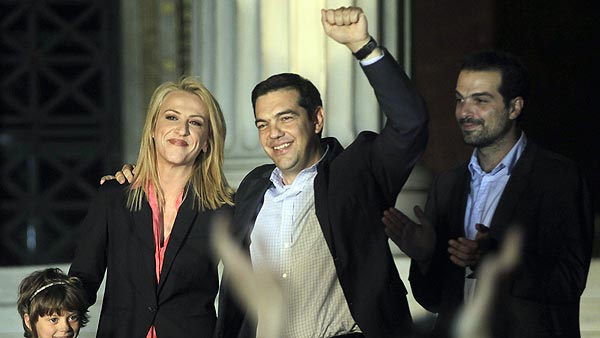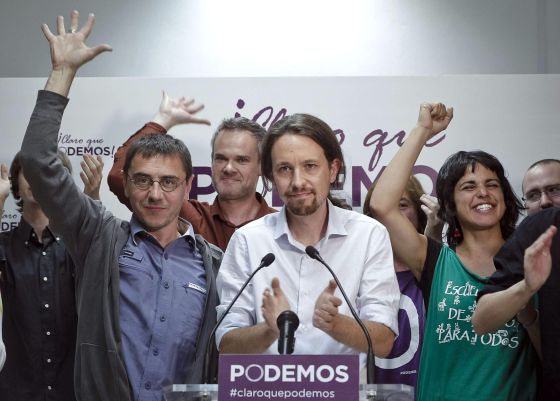European elections: Hope in the gloom as left gains in Greece, Spain, Ireland

[See a table containing all the results for the European left, Green and left nationalist parties at the end of the article.]
By Dick Nichols
May 30, 2014 – Links International Journal of Socialist Renewal/Green Left Weekly, an earlier version of this article appeared at Green Left Weekly – The result of the May 25 European parliamentary poll was dominated by the victories of the xenophobic and racist National Front (FN) in France (26%, 24 MEPs, Members of the European Parliament) and the United Kingdom Independence Party (UKIP) in Britain (26.8%, 24 MEPs). It has set off a wave of mainstream media angst across the old continent.
The angst is understandable. Five years after the 2009 European elections, the political basis for European Commission austerity policy has been severely weakened and “governance” of the 28-member European Union has become even more fraught.
Moreover, old European spectres have re-emerged, with a surge in support for formations that directly identify as Nazi or fascist—like the Golden Dawn in Greece, Jobbik in Hungary and the National Democratic Party (NDP) in Germany. Their victories are a direct result of the economic crisis and the austerity policies of “Brussels”.
From scoring 0.46% and 23,566 votes in the 2009 European Parliament elections, Golden Dawn has risen to 9.38%, with hundreds of thousands of supporters.
The tide of respectable xenophobia is also at a flood. The Danish People’s Party (DFP) topped the poll in Denmark; the New Flemish Alliance (NVA)—specialist in “reasonable” scapegoating of migrants and French-Belgian welfare recipients—won in Belgium (16.35%); and the racist Austria Freedom Party (FPÖ) came in third with a score 19.7%, as did Dutch islamophobe Geert Wilders’ Party for Freedom (PVV) (13.2%).
These are horrible results, and the victory of France’s National Front (FN) in the country of western Europe’s greatest revolution for democracy the most horrible of all.
Yet they were inevitable. With anti-austerity left parties and coalitions failing to reach a threshold of political credibility in many countries, a mass vote for right-wing populists posing as opponents of the system was certain.
Contradictions
Yet the outcome is fraught with contradictions. Despite appearances and despite the apocalyptic response of mainstream politicians like France’s Socialist Party prime minister Manuel Valls (”it’s an earthquake”), the result does not represent a massive general swing to the right across all Europe, but more a hollowing out of the mainstream right and centre-right by the eurosceptic and racist right.
The election has certainly produced a partial rightward shift, with the greatest losses being experienced by the ruling European People’s Party (EPP—down 61 seats to 213 seats in the 751-seat European parliament.
At the same time, however, the broadly defined left—covering the social-democratic Progressive Alliance of Socialists and Democrats (S&D, 191 seats), the Greens-European Free Alliance (Greens-EFA, 52 seats) and the anti-capitalist left’s European United Left-Nordic Green Left (GUE-NGL, 42 seats)—has increased its presence, from 37.6% to38.5% of the European parliament.
Within this left both greens and social democrats have lost, while the GUE-NGL and the left and centre-left nationalist forces within the EFA (which groups together MEPs from “nations without a state”) have gained. If new left forces, like Spain’s Podemos, enter the GUE-NGL the relative weight of the anti-austerity left will have grown even more noticeably (see Table).
The two main right parliamentary groups—the EPP and the anti-federalist and eurosceptic European Conservatives and Reformists (ECR)—had 43.2% of seats before May 25. Afterwards, their share has fallen to 34.5%. The strength of the centre-right Alliance of Liberals and Democrats for Europe (ALDE) has also declined, from 10.8% to 8.5%.
The winners on the right are the Europe of Freedom and Democracy (EFD) group, basically an alliance of the UKIP and Italy’s Northern League, which has grown from 4% to 5.1% of seats. The winning far-right forces, like the FN and Golden Dawn, have yet to form a parliamentary group—and seem very unlikely to be able to do so, as they almost certainly won’t meet the parliamentary requirement of 25 MEPs from at least seven member states. The UKIP, for example, has announced that it will not be forming a fraction with Le Pen and Golden Dawn.
Signs of hope: Greece and Spain
The main immediate impact of May 25 is to destroy the right and centre-right majority that was the basis for European Commission austerity, and to increase the pressure on the S&D to form a German-style broad governing coalition with the EPP.
Yet, this choice would have to be carried out in a Europe where the two countries that have seen the highest level of social struggle—Greece and the Spanish state—have also seen the greatest growth of left anti-austerity alternatives, and the greatest level of crisis of social democracy itself.
This trend reached a new high at this European election.
In Greece, the left coalition Syriza topped the poll with 26.6%, 3.9% more than the ruling conservative New Democracy. Pasok, the Greek social democratic party, ran as part of the Olive Tree-Democratic Alignment, which scored only 8.1%. In the aftermath, Syriza leader Alexis Tsipras has demanded early elections in Greece.
In Spain, the election delivered a possibly mortal blow to the two-party system of the ruling People’s Party (PP) and the opposition Spanish Socialist Workers Party (PSOE): between them the main parties of the post-dictatorship transition could only manage 49.1%, 5 million votes less than in the 2009 European election.

Podemos supporters celebrate.
At the same time, the vote for the Plural Left (electoral coalition led by the United Left) rose from 3.7% to 10% (two seats to six), while newcomer Podemos (“We Can”), seen by many in the indignado generation as their own organisation against the “political class” and attracting a vote that may well not have gone to the Plural Left, achieved an astonishing 8% (five seats).
In those parts of the Spanish state where the struggle against austerity and cuts to public services has been fiercest, such as Madrid and the Balearic Islands, Podemos actually outscored the Plural Left.
Left and centre-left national forces also advanced, most notably in Catalonia, where an 11 percentage-point lift in the participation rate saw the Republican Left of Catalonia (ERC, 23.7%) defeat the ruling right-nationalist Convergence and Union (CiU, 21.9%), the first time the oldest party of Catalan nationalism has won an election since 1932.
At the same time, Initiative for Catalonia-Greens (ICV), allied in Catalonia with the United Left, lifted its vote to 10.3% (from 6.1% in 2009).
The crisis of social democracy is beginning to take on Pasok-like dimensions in Catalonia. At this poll the Party of Catalan Socialists (PSC), easy winner of the 2009 European election with 36%, was reduced to 14.3% (350,000 votes less), and for the first time ever fell behind ICV in Barcelona city.
Left nationalist and regionalist forces also won seats in the Basque Country and Valencia.
Italy, Ireland, Portugal
The other countries where the progressive anti-austerity vote most rose were Ireland and Italy. In Ireland, Sinn Fein, the traditional party of left nationalism, more than doubled its vote to 17% on the basis of opposition to austerity (winning three seats in the South) and retained the one seat it held in the northern Six Counties still ruled by the UK.
In Italy, the new formation The Other Europe with Tsipras—won three seats, returning the country’s anti-capitalist left to a presence in the European parliament after its disastrous 2009 failure to win any seats.
In Portugal, the other country most hit by the crisis, social democracy has managed a partial recovery at the expense of the anti-capitalist left, in particular the Left Bloc. The Socialist Party vote, at 26.5% in 2009, has climbed to 31.5%, while the combined far-left vote of the Communist Party-Greens and Left Bloc (21.4% in 2009), has fallen to 17.2% at this election, with the Left Bloc vote falling from 10.7% to 4.6%.
However, the Portuguese political scene has also been marked by the dramatic emergence of a newcomer representing mass discontent—the Party of the Land, which won 7.1% and two seats.
Another welcome advance has been the success of Sweden’s Feminist Initiative, which won one seat with a vote of 5.3% (more than double its 2009 score).
New phase
Forces like Podemos and The Other Europe-with Tsipras will now have to decide whether they enter the GUE-NGL group. If, as seems likely, they do, a strengthened left in the European parliament will be better placed to support the social struggles that lie at the root of its growth.
A further step—not easy but not inconceivable—would be for the left to find ways to collaborate with the radical eurosceptic Italian Five Stars Movement of Beppe Grillo, which won 21.2% and 17 seats on May 25.
In immediate terms, the most positive impact of this election will be on the national political struggle in the Spanish state and Greece.
At the time of writing Podemos spokesperson Pablo Iglesias has stated that collaboration with Syriza will be a priority for the organisation and its MEPs.
At the same time, the national secretary of the PSOE, Alfredo Perez Rubalcaba, has called an emergency PSOE congress and announced that will not contest his position at it.
Combined with the announcement that dissident Party of Catalan Socialists members are planning to run their own ticket in the 2015 municipal elections, Rubalcaba’s resignation has unleashed a wave of internal factional turmoil within the PSOE, increasing the perception that social democracy in the Spanish state is teetering on the edge of a precipice.
[Dick Nichols is Links International Journal of Socialist Renewal’s and Green Left Weekly’s European correspondent, based in Barcelona. An earlier version of this article appeared at Green Left Weekly. For full results go to http://www.elections2014.eu/en.]

9 Scariest Far-Right Parties Now In The European Parliament
One has a leader with a swastika tattoo, one wants to rid his entire country of Muslims, another has a founder who suggested releasing the Ebola virus on migrants. This is the class of 2014, the parties set to enter the European Parliament as part of the Union's most eurosceptic, far right, anti-immigrant intake of all time.
Though the British National Party had their one MEP dismissed by voters, this year is the first time openly neo-Nazi parties will sit in Brussels as representatives of their nations.
The European fringe of what Boris Johnson described as "bizarre or downright potty" have flooded the chamber.
Almost all are Eurosceptic, joining the mainstream anti-EU parties like Britain's Ukip to make up around a third of the parliament.
Here's the full rundown: